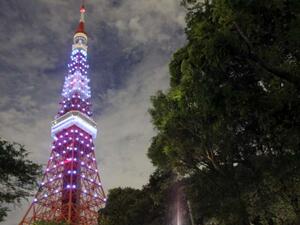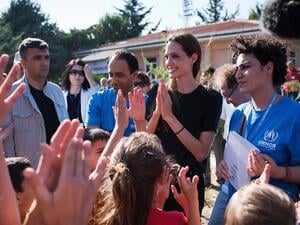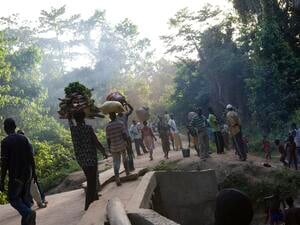High Commissioner's message for World Refugee Day, 20 June 2011
High Commissioner's message for World Refugee Day, 20 June 2011
More than sixty years ago, Europe's most destructive war left millions of traumatized people homeless and displaced. Shocked by the atrocities that had occurred, world leaders vowed to elevate the value of each and every human life. Thousands of people were welcomed as resettled citizens in new countries. Going further, the international community created the landmark 1951 Refugee Convention. Countries that signed it vowed to respect the right of individuals to seek asylum and refrain from returning refugees to places where their lives or freedom would be in danger. The recently created United Nations mandated UNHCR to protect and assist refugees.
Though initially confined to displacement within Europe, the Convention grew in relevance with each and every conflict. With each and every war, people were forced to flee their homes to survive and to seek safety across borders. In my work as High Commissioner, I have met thousands of the individual refugees we care for. And I can tell you that they are among the most vulnerable and yet the most resilient people on earth.
It is with a heavy heart that I acknowledge today that there are now more than 43 million people displaced by violence and persecution around the world. That's 43 million people forced from their homes, torn from their communities, and left unsure of their destinies. More than 15 million of them are refugees while the rest are men, women and children displaced within their own countries.
Nearly 850,000 people sought asylum last year. South Africa recorded the largest number of individual claims, with over 180,000 - approximately one in every five worldwide. Particularly distressing is the rise in asylum applications made by children unaccompanied by an adult or separated from their parents. These totaled 15,500 last year, the largest numbers by Afghan and Somali children, and were filed in 69 countries throughout the world.
This is why today I ask the question, are we doing enough? Are we doing enough to prevent conflict and to bring to an end those already underway? Are we doing enough to help every one of these 43 million people to find refuge and a future home? Are we doing enough to promote the tolerant and compassionate societies that welcome the less fortunate and do not add to their number?
The resilience of conflict today is especially concerning. Old wars are not being resolved, they're just being forgotten. And so too the refugees left in their wake. Endless violence is preventing millions of people from returning home. Last year was the poorest in 20 years for such voluntary return.
Without other options, uprooted people risk living in limbo for decades in camps or, increasingly, in urban shantytowns. Today more than seven million refugees are stuck in so-called protracted situations.
At the same time, the very same conflicts are causing new waves of displacement. Every month, up to 10,000 wearied and terrified Somalis flee across the border to the Dadaab refugee camp in Kenya, now home to as many as 350,000 refugees.
The big difference today, more than 60 years after the end of World War II, is that Europe is no longer home to most of the world's refugees. Despite what some populist politicians would have us believe, approximately 80 percent, are hosted and cared for in developing countries.
To take a current example, only about two percent of the people fleeing Libya are seeking refuge in Europe. The vast majority of the nearly one million people so far to have fled Libya have gone to Tunisia and Egypt. These states have kept their borders open and their people have opened their homes and hearts to those arriving.
At the same time but with less attention, the people of Liberia have shown a similar solidarity with the more than 100,000 people fleeing the recent violence in Côte d'Ivoire.
Such generosity has been evinced for years or even decades in countries like Bangladesh, Chad, Ecuador, Ethiopia, Iran, Jordan, Kenya, Nepal, Pakistan, Sudan, Syria and Tanzania. It is rooted in a shared humanity - and a shared belief that there are no tolerable levels of suffering. It is a recognition that even one person forced to flee war or persecution, is one too many.
I have chosen to spend this World Refugee Day in Europe, where the Refugee Convention was born, and in Italy, whose efforts, along with those of Malta, to rescue and protect people risking their lives to escape Libya on overcrowded, dilapidated boats, will remain critically important for the foreseeable future. No one knows or will ever know how many have lost their lives at sea since the exodus began in March but we estimate that as many as 1,500 people have drowned. That is roughly one person for every ten attempting the passage. I spoke to survivors in Lampedusa who told me, if their eyes had not already, of the trauma they endured.
On this World Refugee Day and in the spirit of the refugee protection system that began in Europe 60 years ago, I believe it is time for all of us, individuals and states, to recommit to the humanitarian values enshrined in the 1951 Refugee Convention. Since even one person forced to flee, is one too many, we have to do more to keep borders open and guarantee access to fair asylum procedures everywhere.
We need to do more to promote peace in the countries that refugees come from and to support them to return home in safety and dignity. Where this is not possible but integrating locally may be, such as Tanzania's provision of citizenship to more than 162,000 Burundian refugees, we need to strongly support countries' efforts in this regard. We also need to increase the number of resettlement places in third countries so refugees everywhere can be restored to hope and the prospect of new lives.
For as long as conflicts see no end, helping those they displace will remain our collective responsibility.





